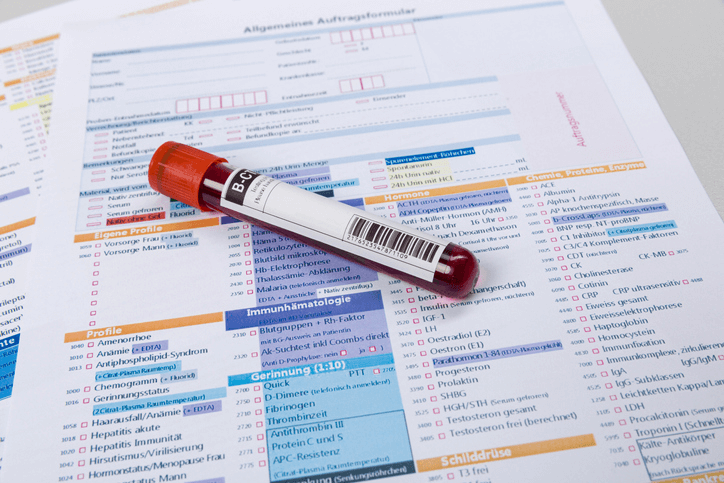Get Started
Complete the short form belowto Contact a Nexel Medical physician
Before you can begin any form of hormone therapy—whether it’s Testosterone Replacement Therapy (TRT) or Human Growth Hormone (HGH) Therapy, you’ll first need a thorough evaluation of your hormone levels. At Nexel Medical, we require blood testing as the first step in determining whether hormone deficiencies may be at the root of your symptoms.
Our clinics use a combination of targeted and comprehensive hormone panels to detect imbalances, with a specific focus on testosterone and HGH. These panels help our physicians understand the full picture of your hormonal health, including the function of the hypothalamic-pituitary axis, which governs the production of key hormones such as growth hormone and testosterone.
Before any blood work is ordered, every patient at Nexel Medical undergoes a detailed physical examination and medical history review. You’ll be asked to describe your symptoms—how they started, how long you’ve had them, and how they may have changed over time.
If low testosterone or age-related testosterone deficiency is suspected, a blood test is the most reliable way to confirm the diagnosis.
Testosterone is essential for maintaining a man’s vitality and well-being, and levels naturally decrease as men age. Low testosterone (Low T) can negatively affect multiple aspects of life, including physical, emotional, and sexual health.

A proper diagnosis of low testosterone includes a physical exam, a review of your symptoms, and a blood test. Common symptoms include:
A testosterone blood test is performed to measure the amount of testosterone circulating in your bloodstream. Normal ranges are typically between 300 and 1,000 ng/dL, but your levels can fluctuate during the day—usually peaking in the early morning. That’s why we tend to schedule testosterone testing in the morning for the most accurate results.
Although some home testing kits rely on saliva samples, blood testing remains the gold standard. A comprehensive testosterone blood test provides more accurate information about your total testosterone and free testosterone levels and helps determine the best course of treatment.
While any medical provider can order this test, working with hormone specialists like those at Nexel Medical ensures a deeper understanding of age-related hormone loss and more targeted treatment options.
For most testosterone tests, no special preparation is required, though timing is important. The majority of testosterone in your bloodstream is bound to proteins like SHBG (sex hormone-binding globulin), while a smaller portion exists as free testosterone. Both are considered bioavailable.
Most basic testosterone panels test for total testosterone, but to get a more precise view of your hormonal profile, your Nexel Medical provider may order a free testosterone test as well. This helps us better tailor your treatment plan to your individual needs.
Yes. Although testosterone is often labeled a “male hormone,” women also produce and rely on testosterone for healthy sexual function, energy levels, and mood. In women, testosterone levels tend to drop more significantly around menopause. For women experiencing symptoms like low libido, fatigue, or mental fog, a testosterone blood test may reveal an underlying hormonal imbalance.
Human Growth Hormone (HGH) levels vary significantly depending on age, gender, time of day, and overall health. Unlike other hormones, HGH is released in short bursts, especially during sleep, so it’s difficult to measure precisely with a single blood draw. That’s why doctors often use an IGF-1 test, which provides a more stable reflection of average HGH activity in the body.
That said, general reference ranges for IGF-1 (the key marker used to evaluate HGH status) are:
If your levels fall significantly below these ranges and you’re experiencing symptoms like chronic fatigue, reduced muscle tone, or cognitive decline, it may point to adult growth hormone deficiency. Nexel Medical uses these values along with a full clinical evaluation to determine if HGH therapy is appropriate.
Testosterone levels naturally fluctuate throughout the day, especially in men, so timing and context are key to proper diagnosis. At Nexel Medical, we typically test testosterone levels in the early morning when they are at their peak.
Here are standard reference ranges for total testosterone:
In addition to total testosterone, your provider may also check free testosterone levels, which represent the portion of testosterone available for use by your body. Even if total testosterone appears normal, low free testosterone could still result in symptoms.
It’s also important to interpret these results based on symptoms, not just numbers. Some men feel symptomatic with levels around 350 ng/dL, while others may feel fine until they drop below 250 ng/dL. Likewise, women with testosterone at the low end of the range may experience fatigue, low libido, and mood instability.
At Nexel Medical, we combine hormone testing with in-depth consultations to make sure we address the root cause of your symptoms—not just treat a number on a lab report.
If your blood sample confirms low testosterone, Nexel Medical may recommend testosterone replacement therapy. TRT can be administered in several forms, including injections, transdermal patches, topical creams, oral tablets, or hormone pellets. However, based on our experience, testosterone injections offer the most reliable and consistent results.
Patients with clinically low testosterone levels who begin therapy often report major improvements in:
A blood test is the only way to confirm whether your symptoms are the result of low testosterone—and whether TRT is right for you.
To be eligible for HGH therapy, you must first be diagnosed with a growth hormone deficiency (GHD). This requires specialized testing, as HGH levels naturally fluctuate throughout the day. A single HGH reading is not enough to determine if you’re truly deficient.
That’s why Nexel Medical utilizes stimulation and suppression tests to accurately assess your growth hormone production.
Unlike simple blood draws, HGH testing involves evaluating how well your pituitary gland responds to stimuli. During a stimulation test, a substance is introduced to prompt the gland to release HGH. Afterward, your blood is analyzed to see how your body responds.
In addition to this, Nexel Medical may also run an IGF-1 (Insulin-like Growth Factor 1) blood test. IGF-1 reflects your average HGH levels and is often a better marker for chronic growth hormone deficiency than HGH itself.
Depending on the type of HGH testing you’ll undergo, your Nexel Medical provider may recommend the following preparations:
Always follow your doctor’s instructions closely to ensure accurate results.
If your lab results show insufficient HGH production, you may be a candidate for HGH replacement therapy. At Nexel Medical, we treat adult growth hormone deficiency with carefully monitored prescription HGH injections.
Potential benefits of HGH therapy for adults with low levels include:
Growth hormone therapy is not one-size-fits-all. The only way to determine whether you need it is through proper testing and diagnosis.
If you’re over 40 and struggling with fatigue, low sex drive, trouble focusing, or chronic low mood, schedule a consultation at Nexel Medical. A simple blood test may be the first step to reclaiming your vitality and overall health.
1. Why do I need a blood test before starting hormone therapy?
Hormone therapy isn’t something that should ever be started blindly. A blood test gives your provider a clear view of your hormone levels and helps determine whether a deficiency or imbalance is the root cause of your symptoms. At Nexel Medical, your treatment plan will always be based on lab-confirmed results to ensure safety and effectiveness.
2. What’s the difference between total and free testosterone in a blood test?
Total testosterone measures all the testosterone in your blood, including what’s “bound” to proteins and what’s free. Free testosterone represents the unbound portion that your body can actually use. Both levels are important, and your Nexel Medical provider may test for both to get a complete picture of your testosterone status.
3. When is the best time of day to take a testosterone blood test?
Testosterone levels are highest in the early morning—usually between 7:00 and 10:00 a.m. That’s why Nexel Medical schedules testosterone blood draws in the morning to get the most accurate and consistent readings.
4. Can I eat or take medications before my hormone blood test?
It depends on the specific test. For most testosterone and IGF-1 tests, fasting is not required. However, some HGH stimulation tests may require fasting or medication restrictions. Your provider at Nexel Medical will give you clear instructions ahead of your appointment based on the type of testing being performed.
5. How long does it take to get hormone blood test results?
Most hormone blood test results are available within a few business days. Once your results are in, a Nexel Medical provider will review them with you, explain what they mean, and walk you through your personalized treatment options if needed.
6. Can women get hormone blood testing, too?
Absolutely. Hormone imbalances affect both men and women, especially with age. Women may experience declines in testosterone, estrogen, progesterone, or growth hormone—all of which can be evaluated through blood testing at Nexel Medical. Our physicians are highly experienced in hormone therapy for both men and women.
Now that you understand how to have your testosterone and HGH levels tested, why not Contact Us today and Get Started?
Complete The Short Form Below To Contact a Nexel Medical Physician
